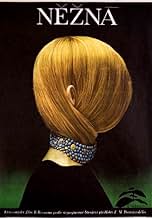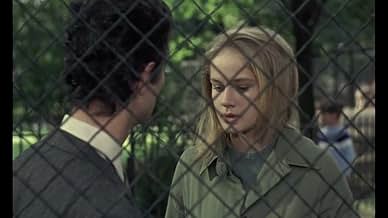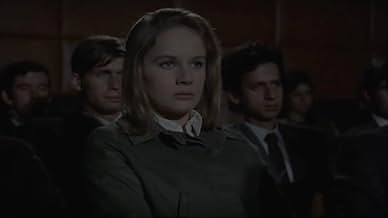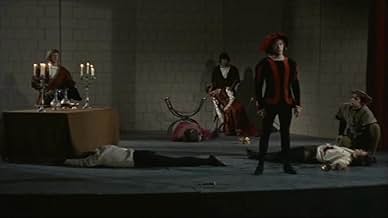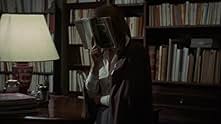IMDb-BEWERTUNG
7,3/10
3244
IHRE BEWERTUNG
Eine Frau bringt sich um und hinterlässt ihrem trauernden Ehemann keine Erklärung. Wir erfahren in Rückblenden, wie sie sich kennen gelernt und geheiratet haben und wie es ihr nicht gelungen... Alles lesenEine Frau bringt sich um und hinterlässt ihrem trauernden Ehemann keine Erklärung. Wir erfahren in Rückblenden, wie sie sich kennen gelernt und geheiratet haben und wie es ihr nicht gelungen ist, ihren Lebensstil an seinen anzupassen.Eine Frau bringt sich um und hinterlässt ihrem trauernden Ehemann keine Erklärung. Wir erfahren in Rückblenden, wie sie sich kennen gelernt und geheiratet haben und wie es ihr nicht gelungen ist, ihren Lebensstil an seinen anzupassen.
- Regie
- Drehbuch
- Hauptbesetzung
- Auszeichnungen
- 1 wins total
Empfohlene Bewertungen
I've had difficulty with Bresson films in the past, because I love what he despises - acting. His films seem to rely on Kuleshov effect, which is to say that you have to feel the actors' emotions by extrapolating from the events that just happened, rather than reading their faces. Some people find this easier than others, for myself, when I watch Kuleshov's experiment I see only a neutral face when the frame cuts to a neutral face! However the Dostoevsky source for this movie is so rich that it allowed Bresson's style to work for me.
Une Femme Douce is a story of a love that fails, and feels very realistic. The success is down to the Bressonian style, which I usually find antithetical. Normal people as opposed to professional actors, are not very facially demonstrative; so when I saw the couple in this movie I really felt like I was watching a real couple. The lack of demonstration leads to a sense of ambiguity at key moments. There's a kind of Renoir-ian multifacetedness which tends to see a person as a congregation of souls pulling in different directions, jostling for the rudder, rather than as a coherent identity. But there's also ambiguity in the sense that the couple plain just can't read each other at points. There are several examples of uncorrected miscommunication in the film which again feels very authentic in terms of relationships.
Some people have great difficulty finding someone to love and share their lives with, may only get one attempt at something that could work, and often fail. That's a great, very human tragedy, that you don't get to see very often at the cinema. This story of a young couple, the man a pawnbroker, Luc, the woman simply known as "elle", is a story of two people who don't fit in modern life. She is fey, inquisitive, at home with the natural, distrustful of people, and entirely at odds with the systems of living that define human "progress". Luc is the opposite, a creature of the system, he makes money from debt, has fixed expectations about relationships, and lacks spontaneity. She suffers from weltschmerz, a pain of the sensitive that arises from an understanding or feeling of how life could or should be in comparison to the dismal and feeble structures that we have. They try to inhabit the centre ground together, but the compromise doesn't hold.
I like that the film acknowledges that even the most significant moments in a person's life can be fairly banal, a fleeting disengaged conversation on a bench at the zoo in this film.
Although I chose to see the film as a rather blameless story, you could view "elle" as the victim of Luc, who compares himself to Mephistopheles at one point. The film is feminist under that sense, although I think in a very patronising way. For example, at various points in the movie, the TV in their apartment shows spectacles which are very male-oriented, such as motor car racing. There's a sense that culture is about the male, that authentic female culture is something rare and unpreserved. I don't think that "elle"'s condition is unique to women, it actually reminds me RD Laing on schizophrenia: "The experience and behaviour that gets labelled schizophrenic is a special strategy that a person invents in order to live in an unlivable situation."
It's worth pointing out that the film is substantially aided by the talents of Ghislain Cloquet, one of the great cinematographers, who certainly was shooting only top drawer material in this film.
It is a matter of irony to me that although Bresson chose non-professionals, as usual, for this film, Dominique Sanda ("elle") later went on to win Best Actress at the Cannes Film Festival seven years later. The role demanded someone beautiful, so Bresson picked her up from her job as a model for Vogue. Guy Frangin (Luc) on the other hand has this film as his only credited role.
Une Femme Douce is a story of a love that fails, and feels very realistic. The success is down to the Bressonian style, which I usually find antithetical. Normal people as opposed to professional actors, are not very facially demonstrative; so when I saw the couple in this movie I really felt like I was watching a real couple. The lack of demonstration leads to a sense of ambiguity at key moments. There's a kind of Renoir-ian multifacetedness which tends to see a person as a congregation of souls pulling in different directions, jostling for the rudder, rather than as a coherent identity. But there's also ambiguity in the sense that the couple plain just can't read each other at points. There are several examples of uncorrected miscommunication in the film which again feels very authentic in terms of relationships.
Some people have great difficulty finding someone to love and share their lives with, may only get one attempt at something that could work, and often fail. That's a great, very human tragedy, that you don't get to see very often at the cinema. This story of a young couple, the man a pawnbroker, Luc, the woman simply known as "elle", is a story of two people who don't fit in modern life. She is fey, inquisitive, at home with the natural, distrustful of people, and entirely at odds with the systems of living that define human "progress". Luc is the opposite, a creature of the system, he makes money from debt, has fixed expectations about relationships, and lacks spontaneity. She suffers from weltschmerz, a pain of the sensitive that arises from an understanding or feeling of how life could or should be in comparison to the dismal and feeble structures that we have. They try to inhabit the centre ground together, but the compromise doesn't hold.
I like that the film acknowledges that even the most significant moments in a person's life can be fairly banal, a fleeting disengaged conversation on a bench at the zoo in this film.
Although I chose to see the film as a rather blameless story, you could view "elle" as the victim of Luc, who compares himself to Mephistopheles at one point. The film is feminist under that sense, although I think in a very patronising way. For example, at various points in the movie, the TV in their apartment shows spectacles which are very male-oriented, such as motor car racing. There's a sense that culture is about the male, that authentic female culture is something rare and unpreserved. I don't think that "elle"'s condition is unique to women, it actually reminds me RD Laing on schizophrenia: "The experience and behaviour that gets labelled schizophrenic is a special strategy that a person invents in order to live in an unlivable situation."
It's worth pointing out that the film is substantially aided by the talents of Ghislain Cloquet, one of the great cinematographers, who certainly was shooting only top drawer material in this film.
It is a matter of irony to me that although Bresson chose non-professionals, as usual, for this film, Dominique Sanda ("elle") later went on to win Best Actress at the Cannes Film Festival seven years later. The role demanded someone beautiful, so Bresson picked her up from her job as a model for Vogue. Guy Frangin (Luc) on the other hand has this film as his only credited role.
Based on a short story by Fyodor Dostoevsky, Robert Bresson's A Gentle Woman is the story of Elle (Dominique Sanda), a beautiful young woman who, without any forewarning, jumps to her death from the balcony of her Paris apartment. We do not see the actual event, only a hand opening a door, a table falling over, a flower pot breaking, and a white scarf floating limply through the air. Her story is told almost matter-of-factly by her husband Luc (Guy Frangin) to his maid (Jeanne Lobre) as he stands by her bed next to the body but we are no clearer about the "why" at the end than we were at the beginning.
Although the film is Bresson's first in color and perhaps more accessible than many of his films, it is also full of his typically enigmatic details and coincidences that may be clues to the fate of the characters. Like most of his films, the actors are non-professionals with the exception of Ms. Sanda and the performances are emotionally detached yet rich in nuance and body language and the overall experience is powerful and haunting. In flashback, we discover that her husband Luc is a pawnbroker and the two meet when she comes to his store to sell a crucifix. The distinction between her spiritual nature and his obsession with material things is apparent when he strips off the plastic statue of Jesus, keeping only the gold cross that he deems to be of some value.
Moved by her poverty and enamored with her striking features, he pays more than the cross is worth, but she returns it to him saying that she cannot be bought. Though he pursues her with determination, Elle at first resists. "You don't want love", she tells him. "You want me to agree to marry you." Luc insists that he can take her away from her sordid surroundings and provide her with a home, saying, "Say yes and you can leave here forever." And she at last agrees but it is clear from the beginning that the marriage is a mismatch and throughout the film, Bresson conveys a growing mood of claustrophobia and growing oppressiveness. Luc appeals to her spiritual nature by taking her to museums, operas, and plays and buying her phonograph records but there is something missing.
On the surface he loves her, but he is cold, humorless, and unable to understand or meet her deepest needs. On the other hand, Elle is withdrawn, given to long periods of silence, and makes little attempt to communicate her feelings. Indeed, she may be clinically depressed, but Bresson deals with people's problems in existential rather than psychological terms. "For myself", he has said, "there is something which makes suicide possible, almost inevitable the feeling of void which is impossible to bear." Perhaps Bresson views suicide, at least on one level, as an act of spiritual redemption and A Gentle Woman may have that implication, though the film is very much open to interpretation.
One day Elle picks up a gun and points it at Luc but cannot pull the trigger. Inevitably they fight over money and his jealousy surfaces when he discovers her sitting with a young man in a parked car, even though he hears her reject the man's advances. When she becomes ill, he is generous in providing treatment and the relationship seems to be moving in the right direction until, both fearful of intimacy and afraid of being alone, something within her snaps. Mentally confused or perhaps clear for the first time, she steps out onto the balcony and finds her way home.
Although the film is Bresson's first in color and perhaps more accessible than many of his films, it is also full of his typically enigmatic details and coincidences that may be clues to the fate of the characters. Like most of his films, the actors are non-professionals with the exception of Ms. Sanda and the performances are emotionally detached yet rich in nuance and body language and the overall experience is powerful and haunting. In flashback, we discover that her husband Luc is a pawnbroker and the two meet when she comes to his store to sell a crucifix. The distinction between her spiritual nature and his obsession with material things is apparent when he strips off the plastic statue of Jesus, keeping only the gold cross that he deems to be of some value.
Moved by her poverty and enamored with her striking features, he pays more than the cross is worth, but she returns it to him saying that she cannot be bought. Though he pursues her with determination, Elle at first resists. "You don't want love", she tells him. "You want me to agree to marry you." Luc insists that he can take her away from her sordid surroundings and provide her with a home, saying, "Say yes and you can leave here forever." And she at last agrees but it is clear from the beginning that the marriage is a mismatch and throughout the film, Bresson conveys a growing mood of claustrophobia and growing oppressiveness. Luc appeals to her spiritual nature by taking her to museums, operas, and plays and buying her phonograph records but there is something missing.
On the surface he loves her, but he is cold, humorless, and unable to understand or meet her deepest needs. On the other hand, Elle is withdrawn, given to long periods of silence, and makes little attempt to communicate her feelings. Indeed, she may be clinically depressed, but Bresson deals with people's problems in existential rather than psychological terms. "For myself", he has said, "there is something which makes suicide possible, almost inevitable the feeling of void which is impossible to bear." Perhaps Bresson views suicide, at least on one level, as an act of spiritual redemption and A Gentle Woman may have that implication, though the film is very much open to interpretation.
One day Elle picks up a gun and points it at Luc but cannot pull the trigger. Inevitably they fight over money and his jealousy surfaces when he discovers her sitting with a young man in a parked car, even though he hears her reject the man's advances. When she becomes ill, he is generous in providing treatment and the relationship seems to be moving in the right direction until, both fearful of intimacy and afraid of being alone, something within her snaps. Mentally confused or perhaps clear for the first time, she steps out onto the balcony and finds her way home.
Bresson's vision is honest. No wonder his works gonna be so disturbing all the time. It's like some kind of a weapon, will shot through some people's guts. A people like Elle's husband. He is an interesting person.
He's gonna try to explain all about her, so we expect as well, what exactly the cause was? What's happen to them? Mostley Elle. But he couldn't explain clearly what's happened exactly. Cos he explain about her which he knew, but won't explain which don't know about her. Maybe that's the point. What Bresson wanted to express.
Not enough lines, but silence speaks. It speaks like a knife. Sanda is very attractive, her appearance sharpened it.
He's gonna try to explain all about her, so we expect as well, what exactly the cause was? What's happen to them? Mostley Elle. But he couldn't explain clearly what's happened exactly. Cos he explain about her which he knew, but won't explain which don't know about her. Maybe that's the point. What Bresson wanted to express.
Not enough lines, but silence speaks. It speaks like a knife. Sanda is very attractive, her appearance sharpened it.
Like Mouchette Bresson's earlier film revolves around the mystery of a waif. No one can grasp her true needs only desire her and unwittingly destroy her. The film has several key occurrences that appear to happen by chance. The male lead, the waif's husband, when searching for her on an dimly lit street says to himself "why did I choose to go this way?" and as if by premonition runs into his wife who seated in a car with someone that we, the viewer, and the husband never get to see.
This is Bresson's first film in color and is exquisitely photographed by Ghislain Cloquet in mostly muted tones with each scene containing some object that is the color green. A symbol for money? Perhaps, I don't know if that symbolic color is the same for the French. Also, as in the film Mouchette, the recurring sounds of street traffic occur throughout the film. A motif for the continual monotony of life? I decidedly don't know or understand what this film means but as you can see I'm obsessed with trying to figure it out. And like the husband in the film I was drawn to endure it because of the enchanting Dominique Sanda.
The nail in the coffin in this extraordinary film is very similar to the burnt out stake at the end of Bresson's 'The Trial of Joan of Arc'. It says quite simply, this is the end, it is finished. The tortured soul of the woman played to perfection by Dominique Sanda seeks a finality to her suffering, and her combat with the world. She has had enough of material values and struggles, and like any inwardly imprisoned soul, she achieves her release. The playing time of the film is short but it contains many images of the world surrounding her; a visit to a cinema and a mediocre film on the screen, watching a performance of 'Hamlet', giving too much money away in her pawnbroker husband's shop. She does not relate to this, and her husband, brilliantly acted by Guy Frangin, tries to tame her into accepting the ways of a selfish, money orientated world. She states clearly she is not concerned with money, and as far as I can see she marries out of a sense of despair and not love, perhaps knowing that her husband will push her to the limit of endurance and give her the strength to execute herself. As in the Joan of Arc story, she is resigned to execution as the only way out of an existence she cannot understand. For Elle (which literally means she) her husband will be her executioner, not by intent, but by simply being the very opposite to her with his soiled humanity. She aims a gun at his head and Sanda's eyes say it all. For a moment she wants to kill her killer, but knows by putting down the gun that she is the one to be killed, and that person can only be herself. As for the film itself, only Bresson could have made it, with his austere vision of the human hell we live in. Watch 'The Devil, Probably' and 'Mouchette' to see that only the killing of the body we inhabit can save us. A negative interpretation? I have no idea. It is just what I saw in this great and seldom seen film. I have a poor copy of it and it is a disgrace that unlike most of Bresson's films this one is so hard to find. It is up there with the finest he made, and his use of muted colour only enhances the trivialities and the transience of Paris in 1969. That Paris has gone, but a Paris with even more materialism has taken its place. For those who recall the city 50 years ago, it is moving to see a once celebrated bookshop 'La Hune' sandwiched between two cafes of literary repute, and to see the same place now transformed into an excess of empty luxury goods and even more monetary values. Elle in 'Une Femme Douce' would I believe sacrifice herself again.
Wusstest du schon
- WissenswertesRobert Bresson chose Dominique Sanda just as a result of her first voice call.
- Patzer(at about 18 minutes) Guy and Dominique swap places in their cinema seats before they are actually seen to do so in the final shot of that scene.
Top-Auswahl
Melde dich zum Bewerten an und greife auf die Watchlist für personalisierte Empfehlungen zu.
- How long is A Gentle Woman?Powered by Alexa
Details
Box Office
- Weltweiter Bruttoertrag
- 2.356 $
- Laufzeit
- 1 Std. 28 Min.(88 min)
- Sound-Mix
- Seitenverhältnis
- 1.66 : 1
Zu dieser Seite beitragen
Bearbeitung vorschlagen oder fehlenden Inhalt hinzufügen

